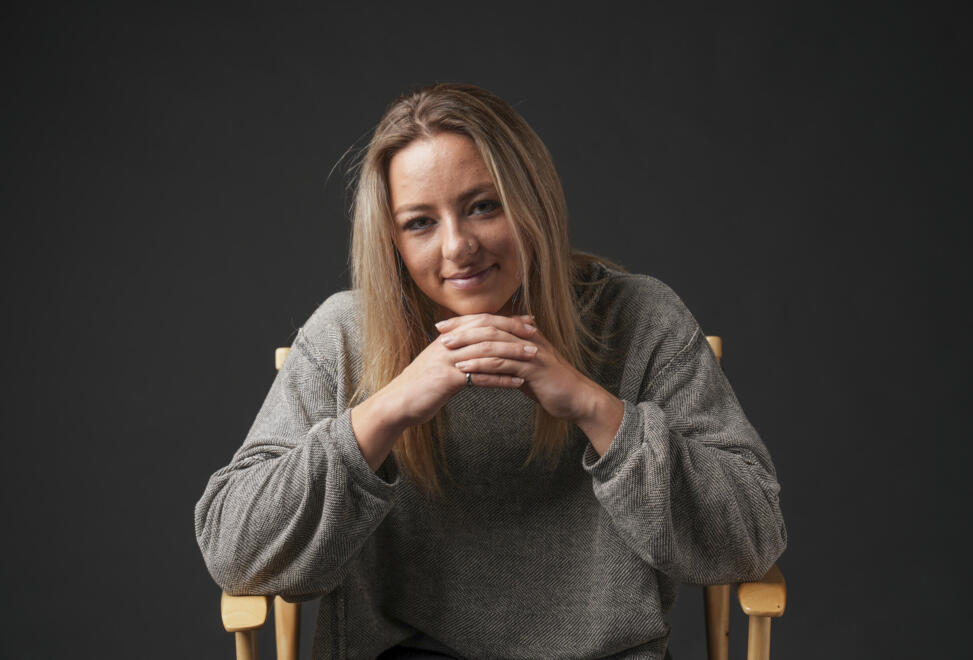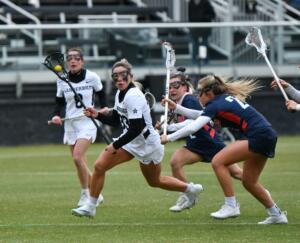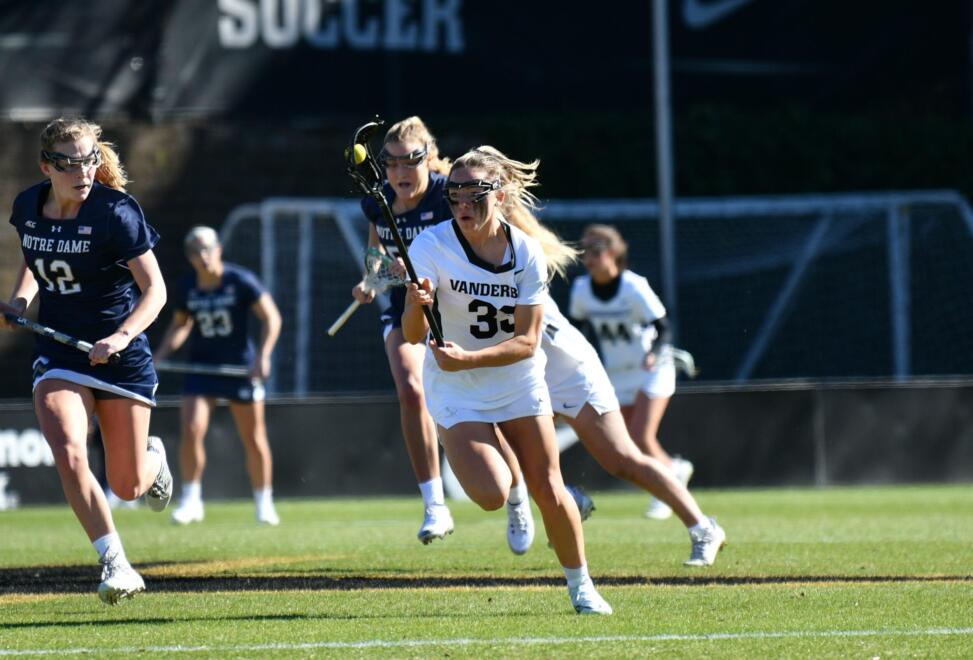Bri doing Bri things. pic.twitter.com/dzEDI1Qhgd
— Vanderbilt Lacrosse (@VandyLacrosse) March 4, 2022
Re-engineering Boundaries
by Graham HaysWhether on the lacrosse field or in the field of engineering, Vanderbilt's Bri Gross redefines what is possible.
NASHVILLE, Tenn. — There was a time when someone like Bri Gross wasn’t supposed to excel in lacrosse. In a sport that has spread only gradually beyond its East Coast roots, Californians like her have often been afterthoughts on the national recruiting scene. Yet this past year, Gross helped lead Vanderbilt to the NCAA Tournament and became one of the first lacrosse athletes from west of the Mississippi River to represent the U.S. in a world championship.
There was a time, too, when someone like Gross wasn’t supposed to excel in engineering. Women in STEM fields have long been underrepresented and often marginalized. Yet this past year, the engineering science major was accepted to a master’s program and completed an internship in which she worked on defense projects sensitive enough that she still isn’t allowed to discuss them in full.
Gross never let supposed boundaries get in her way on the lacrosse field—which turns out to be a good way to redefine what is possible in any field. At Vanderbilt, the honorable mention All-American is not only helping to shape a program emerging as a national contender but also pursuing a passion for engineering that will shape her future.
“Sometimes it gets stressful, thinking that you’re always representing women,” Gross said of excelling in fields of study in which men remain overrepresented. “I know people don’t think like that these days, but sometimes it’s in the back of your mind. So I take it as a challenge. If someone underestimates me or doesn’t think I can do something, it doesn’t make me scared. It’s more, ‘Hell yeah, I’m going to show you what I can do.’
“I think that’s my sports background coming into play. I want to take it on.”

"Nothing surprises us with her. At this point, who knows, maybe she’ll follow that aerospace engineering path and go up to space herself."
Vanderbilt lacrosse coach Beth Hewitt
A lacrosse pioneer in the Golden State
West Coast women’s lacrosse is still in its early adolescence, if not its infancy. There are only six NCAA Division I women’s lacrosse programs in California—one fewer than the number of programs in much smaller states such as Connecticut or Maryland. The current number in California, however, is double what it was a decade ago, about the time when Gross picked up a lacrosse stick for the first time as a grade-schooler.
She didn’t know much about lacrosse before a friend saw an advertisement for a tryout and cajoled her into going. Gross and her family knew basketball best; her older brother, Evan, played guard at the University of Oregon. But it turned out she had a knack for a sport that prized speed, agility, hand-eye coordination and toughness above all else. A sport that, at the time in California, had little choice but to prize potential.
“On the East Coast, you grow up with a stick in your hands,” Gross said. “Out of the womb, someone is handing you a stick on the East Coast. On the West Coast, it was more of a secondary thing. If soccer doesn’t work out, if basketball doesn’t work out, hey, try lacrosse.”
According to statistics from the California Interscholastic Federation, the governing body for high school sports in the state, lacrosse had the 10th most participants among girls sports in the state in 2019–20. Entering the top 10 for the first time, those 10,737 participants represented a nearly 25 percent increase from 2014–15, Gross’ freshman year at Oak Ridge High School in El Dorado Hills, California. For context, girls soccer led the state in 2019–20 with 48,647 participants.
Little wonder then that, removed from even the sport’s relative hotbeds in the Bay Area and Southern California, she competed alongside girls sometimes two or three grades ahead of her as part of the first club team in the Sacramento area that played beyond the scholastic spring season. Mixing ages was the only way Nathan Hendel, the club co-founder who went on to coach Gross at Oak Ridge High School, could fill a roster. Against that modest backdrop, Gross stood out. But as she progressed to higher profile clubs, including in the Bay Area, and was honored as a two-time US Lacrosse High School All-American, she kept standing out.
 “She was rare in the sense of how athletic and gifted she was in the game,” Hendel said. “We hadn’t seen too many players at that level, especially when she got to high school. Very few players in the area got recruited to go play at a D1, top-25, top-40 school.”
“She was rare in the sense of how athletic and gifted she was in the game,” Hendel said. “We hadn’t seen too many players at that level, especially when she got to high school. Very few players in the area got recruited to go play at a D1, top-25, top-40 school.”
Vanderbilt head coach Beth Hewitt, the program’s associate head coach when recruiting Gross, was one of those eager to invest time in West Coast athletes. Although raised on lacrosse almost from the womb, as Gross put it, in the sport’s upstate New York’s cradle, Hewitt helped launch Oregon’s varsity program in 2005. That helps explain why, at Vanderbilt, she was one of the few coaches from an eastern school who showed up at 8 a.m.—5 a.m. on the body clocks of Gross and her teammates—to watch a California club team in a youth tournament.
“Bri just took the game over from the start,” Hewitt recalled. “I was so impressed with her resilience. To me, that’s exactly what we experience as college student-athletes—the travel, the grind, all of it. Seeing her do it under those conditions really made an impression on us.
“Clearly, she’s one of the best players in the country, with what she’s doing with the U.S. program and accomplishments like that. But what she’s doing at Vanderbilt, she’s been doing that from the first time we saw her.”
An engineer comes east
Hewitt saw in Gross what she loves about West Coast recruits: talent paired with a desire to prove wrong the established elites who overlooked her. As it turned out, Gross saw in Vanderbilt what she most wanted too. Or at least what her mom assured her she would grow to want.
For as long as she can remember, considerably longer than she has played lacrosse, Gross has been an inveterate tinkerer. Favorite childhood memories revolve around assisting her dad, a firefighter, with innumerable projects in the garage that doubled as a home workshop (or perhaps vice versa). Long before she was old enough to drive the car in the garage, she could identify, retrieve and often assist in employing any of the tools that also filled the space.
She remains fascinated by how things work—and how they might work better. Anything. Enter a room for the first time, and she begins wondering why the window is where it is or if there is a more efficient way to light the space. Everything is a puzzle waiting to be disassembled and put back together again in a more efficient manner. On the lacrosse field, that isn’t always helpful. Hewitt noted that it took Gross some time to embrace ad-libbing when plans or plays broke down amid competition’s unpredictable nature. For an engineer, it’s the ideal way to think.
“I think there is just an innate focus that she has,” said Courtney Johnson, assistant professor of the practice of technical communications and Gross’ academic adviser. “Some could describe it as being very driven, very motivated, but hers is so natural, it’s almost a humble quality. It’s not overly demonstrative.

“She has a very clear and insightful vision, in that you can tell she’s really observed and reflected on the situation. She laid out a plan for herself. She sets her goals.”
But when you’re in middle school, that mindset isn’t a calling. It’s just who you are. Gross rose to prep prominence before the NCAA revised recruiting rules to limit contact before a student-athlete’s junior year. She was still in eighth grade when she first heard from college coaches. She didn’t know what she wanted out of a university or a major. Few eighth graders do. It was her mom who suggested she think about a prospective school’s engineering options, a suggestion that eventually helped Gross choose Vanderbilt.
By her sophomore year at Vanderbilt, Gross settled on engineering science, a multidisciplinary engineering degree. The major encourages students to develop individual programs around fields ranging from engineering management, communications of science and technology and managerial studies, to human and organizational development or materials science.
Set to graduate this spring, she was recently accepted to Vanderbilt’s master’s program in engineering management. She will be the first Vanderbilt student-athlete to participate in the 30-credit online program, which began in 2019 and runs over three semesters on an accelerated schedule or five semesters on a standard schedule. Lori Ferranti, director of online graduate studies in engineering management, noted that while the program typically accepts applicants with at least three years of experience, exceptions are sometimes made for students with less experience who “demonstrated strong academic performance and leadership qualities.” Gross, she noted, impressed on both counts.
With coursework ranging from technology forecasting to finance and accounting, the program helps students develop business and entrepreneurial skills for advancing in their industries.
“I think if I were sitting behind a desk for months trying to design a single bolt, I would go crazy,” Gross said. “I very much have an engineering brain, and I love problem-solving. But I think if you take my whole personality and entire skill set, engineering management is where I’m going to excel.”
All roads lead to Alabama
Not long after declaring her major, in the spring of her sophomore year, Gross had a fortuitous encounter with an old friend. She discovered that a former coach she had worked with in California had since moved to Huntsville, Alabama. She invited him and his wife to come up to Nashville for a game. Her parents made the trip to Nashville, too, and soon the conversation turned to Gross’ major. The former coach worked for Aerojet Rocketdyne, a “developer and manufacturer of advanced propulsion and energetics systems” whose defense operations are based in the aerospace hub of Huntsville, and he encouraged Gross to apply for an internship.

Delayed a year by the pandemic, she spent this past summer in Huntsville interning in areas related to quality engineering and engineering management. With the U.S. Department of Defense among the company’s clients, Gross, who had to obtain security clearances as part of the work experience, can’t provide details of the projects involved. But lest anyone get too carried away with visions of a spy novel, the work involved such things as creating and maintaining a database to track every part on the shop floor by part number.
“I was working on making things more efficient,” Gross said.
If over the heads of many people, it was fascinating work for someone in her position. A far cry from making coffee runs, the internship at one point even involved making a presentation to Aerojet Rocketdyne CEO Eileen Drake.
“We were obviously asking people questions, but they weren’t holding our hand,” Gross said. “It was very much so that we were immersed in the work experience. I feel like in the three months I was there I gained the equivalent of six months experience in a normal internship.”
If this past summer in Huntsville offered Gross a glimpse of her future beyond lacrosse, she hopes to return to Alabama this coming summer to prolong her competitive exploits. She is awaiting word on a final roster for the U.S. six-on-six team that will compete this July in the World Games in Birmingham.
With six players on the field instead of the 12 in a traditional women’s game, the lacrosse “sixes” format is a recent innovation that shrinks the field and roster and incorporates a 30-second shot clock to keep action moving through four 8-minute quarters. Among other benefits, reducing headcount and venue space potentially makes the sport more appealing to Olympic organizers—as with three-on-three basketball and streamlined versions of rugby.
Gross’ first opportunity to play for her country was the 2019 Under-19 World Championship, a traditional 12-on-12 tournament in which she and two teammates from Texas were the second, third and fourth players from west of the Mississippi to play for a youth or senior women’s national team in a world championship. This past fall, she again put on a USA uniform in the World Lacrosse Super Sixes tournament, a six-team event that utilized the sixes format.
She was again the outsider, whether as a Californian or even as a representative of Vanderbilt amid a sea of athletes from North Carolina, Northwestern or others among the bluest of the sport’s blue bloods. And again, she shrugged off the perceived limits of her position. As her academic adviser put it about her studies, she set her goals, made a plan and followed through.
“Once you get over that everyone is the best of the best,” Gross said, “it’s just about going out and having so much fun playing at this high level—because I get to play with these amazing girls and play at the highest level of lacrosse there is. Once you do that, it’s so much fun.”

"When you are part of a team for so long, you learn how to work with different personalities and how to motivate people in different ways. No two people are motivated by the same thing."
Bri Gross
Leading the way on and off the field
Entering the master’s program next fall will allow Gross to play one more season with her Commodores teammates in 2023, making use of the additional eligibility that the NCAA granted spring sport student-athletes affected by the onset of the pandemic in 2020.
More immediately this spring, with a strong core that includes fifth-year all-conference selections Gabby Forina and Melissa Hawkins and senior captains Emily Brooks, Maddie Souza and Callie Sundin, Vanderbilt aspires to build off last season’s NCAA Tournament appearance. An early victory against nationally ranked Notre Dame highlighted the potential to do just that, Gross contributing two assists. But having Gross around for an additional season will be crucial to maintaining momentum, and not just for the goals and assists she provides out of midfield.
“I know she’s a leader, and she feels like she’s a leader,” Hewitt said. “But all of her teammates need to hear from her for them to buy in to what she’s doing and where she wants to take us. She’s really started to grow in that area. That’s the next step. I look at her as someone who should be captain next year and holding us to a super high standard—getting to a conference championship and winning a conference championship and getting to the NCAA Tournament and progressing through the NCAA Tournament.
“When you have players who have played at an elite international level like she has, she has that experience, so we need to hear from her on an every day basis.”
Not for the first time, lacrosse offers a lesson that will serve her throughout her life. It already showed her she could excel in the face of expectations. What remains is to see if she can lead.
At Vanderbilt, Gross is part of a diverse environment—her master’s program is almost evenly split between women and men. That isn’t always true in the wider worlds of engineering and technology.
According to U.S. Census Bureau data, the percentage of STEM jobs held by women increased from 8 percent in 1970 to 27 percent in 2019, although engineering lagged other fields. A recent Deloitte Global report, meanwhile, projected that women will represent 32.9 percent of the overall workforce in large technology companies in 2022 and 25 percent of the technical roles in those companies. Both are examples of progress—and of how much work remains.
“I am encouraged that she’s going on for her master’s,” Johnson said, “Because I would say probably one of the areas where she could make a big contribution, and where there is still work to do, is in the leadership in the tech sector. There are still opportunities to have more women in those roles.”
Gross isn’t sure which path she will ultimately follow, perhaps aerospace or perhaps working with medical devices—a field she is increasingly drawn toward through Johnson’s mentorship and experience in that area. Perhaps she will find a way to do both. Inevitably, whichever path she chooses, it will be one previously traveled by few women.
After her time at Vanderbilt, on and off the field, she will be ready nonetheless.
“When you are part of a team for so long, you learn how to work with different personalities and how to motivate people in different ways,” Gross said. “No two people are motivated by the same thing. No two people react to criticism or new ideas in the same way. With lacrosse, it gives me an advantage when working with other people.”
Gross still stops by her old high school team’s practices when she goes back to California, where the student-athletes are always eager to learn a new drill the local lacrosse legend picked up at Vanderbilt or with Team USA. Truth be told, Hendel recalled, she had the effect even when she was still in high school and young girls would line up along the fence by the field for autographs.
For Gross, supposedly the one doing the inspiring, their looks and words are no less meaningful.
“She is from here, and she can do it—so I can do it.”
And so times change. Because people change them.
“It makes it all seem not so far removed to them,” Gross said.
